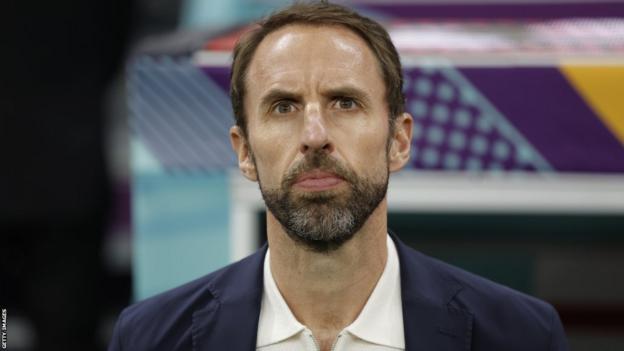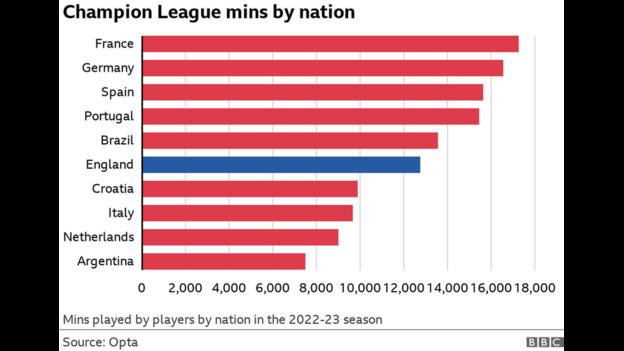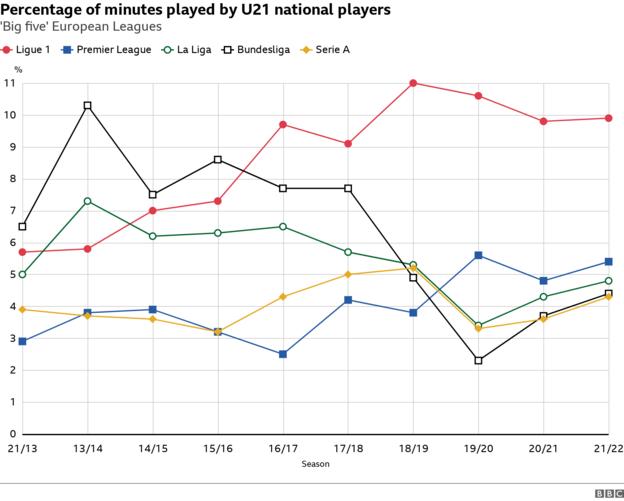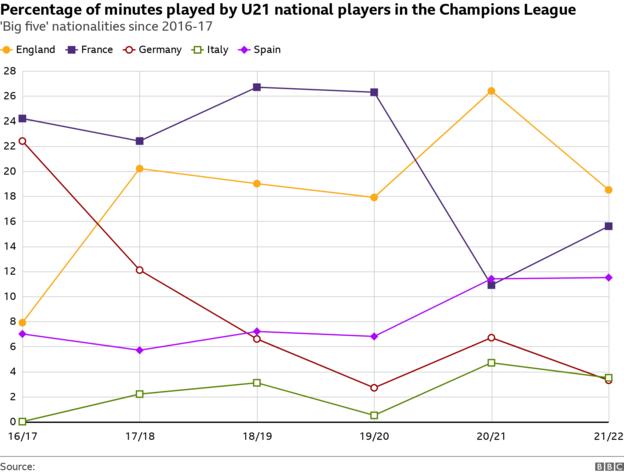Reality check: Is Gareth Southgate right about the lack of English players?
Southgate #Southgate

 Gareth Southgate has managed England at three major tournaments
Gareth Southgate has managed England at three major tournaments
Gareth Southgate has expressed his concern at the apparent lack of English players playing at an elite level and the negative impact it could have on England’s success in the future.
The Three Lions boss believes he – or future England managers – may have to start selecting from the Championship because of what he says is a decreasing number of English players in the top flight.
But is Southgate right to be worried?
BBC Sport has been analysing the numbers to find out…
What did Southgate say?
Southgate said on average 32% of players starting in the top flight were eligible for England, though he highlighted two recent weekends on which that percentage fell to 28%.
“The numbers are the numbers. They’re not going up,” said Southgate, who has been in the role since 2016.
“It has been around 32% but that’s down from 35% when I took over and 38% in the years before so the graph is clear – there’s no argument about that.”
Southgate said the number of English players playing in the Champions League, which he believes is the “best way to judge” a player, also lagged behind international rivals.
“If you look at Champions League minutes this year we are sixth on that list – we’re actually behind Brazil and Portugal,” he said.
“If breaking into the team is the foundation, the Champions League and the upper echelons of the Premier League are the finishing school.”
Southgate fears those decreasing numbers mean England will lack the depth of other major footballing nations, which will lead to less success on the pitch.
Is Southgate right?
When it comes to the numbers, yes.
The percentage of players eligible to play for England in the Premier League has dropped this season compared with the past two. However, the figure is still broadly in line with the five-year average of 32%.
But what about his wider argument?
Well, the playing time of English players at the traditional big six clubs – Manchester City, Manchester United, Liverpool, Chelsea, Arsenal and Tottenham – has been about 27% for the past four seasons, which is actually 16% higher than the average for the four seasons before.
Those figures do not include players who were once eligible for England but have since chosen to play for other nations, such as Bayern Munich’s Jamal Musiala choosing Germany.
That suggests that while the quantity of eligible players has gone down, the quality has gone up because more are playing for the league’s top sides.
When it comes to the Champions League, England are sixth among countries in terms of the amount of minutes played by players eligible for the national team this season.
France, who won the 2018 World Cup and reached the 2022 final, are top of that table, with Germany, Spain, Portugal and Brazil behind them in that order. World Cup winners Argentina are 10th.
 English players have played 12,718 minutes in this season’s Champions League – French players have played the most minutes with 17,228 so far.Does it matter?
English players have played 12,718 minutes in this season’s Champions League – French players have played the most minutes with 17,228 so far.Does it matter?
Not if you look at England’s improved Fifa ranking in recent years compared to the 1990s, shortly after the formation of the Premier League in 1992.
England were ranked outside the top 20 between 1994 and 1996, when 65% of players in the Premier League were eligible for the national side. Since 2018, the Three Lions have had their longest sustained period in the world’s top five, despite that figure dropping to about 34%.
In that time they have reached the semi-finals of the 2018 World Cup and the final of Euro 2020, the previous appearance for the senior men’s side in a major final being at the 1966 World Cup.
But what about the future?
Southgate said the decreasing number of English players in the Premier League was storing up problems for the future and “won’t hit us necessarily in the next 18 months”.
However, the number of young players playing at the top level is actually going up.
The number of English under-21 players appearing in the Premier League has increased over the past decade from 2.9% in 2012-13 to 5.4% in 2022-23, a higher percentage than the top leagues in Spain, Germany and Italy.
 9.9% of the total minutes played in Ligue 1 was played by U21 players eligible for the national team last season, the highest percentage across Europe’s ‘big five’ leagues. The Premier League was second on 5.4%. then La Liga 4.8, Bundesliga 4.4% and Serie A 4.3%
9.9% of the total minutes played in Ligue 1 was played by U21 players eligible for the national team last season, the highest percentage across Europe’s ‘big five’ leagues. The Premier League was second on 5.4%. then La Liga 4.8, Bundesliga 4.4% and Serie A 4.3%
England Under-21 players played more minutes in the Champions League for the past two seasons compared to the other ‘big five’ European nationalities – France, Spain, Italy and Germany.
On average, English under-21 players have had more minutes over the past five seasons than any other nationality, also amassing a 146% increase on the previous five seasons between 2012-13 and 2016-17.
For that period, England was ranked fourth out of the ‘big five’ European nationalities.
 18.5% of all minutes played by U21 players across the ‘big five’ nationalities last season were by England players. France were next with 15.6% followed by Spain 11.5%, Italy 3.5% and Germany 3.3%Does that mean more success?
18.5% of all minutes played by U21 players across the ‘big five’ nationalities last season were by England players. France were next with 15.6% followed by Spain 11.5%, Italy 3.5% and Germany 3.3%Does that mean more success?
The recent success of some of England’s international rivals suggests there is not a link between the number of minutes for players in the world’s best leagues.
For example, it has been a memorable few years for Argentina, winning the Copa America and World Cup, but the lowest number of minutes played by Argentina players in the ‘big five’ leagues over the past 12 years have come in the past three seasons.
Meanwhile, minutes played in the big five leagues for Spanish players was at its lowest between 2010 and 2012. During this period they won the World Cup and European Championship.
However, the recent success of France on the international stage could offer a counter argument.
Les Blues won the 2018 World Cup and the 2021 Nations League, as well as reaching the finals of Euro 2016 and the 2022 World Cup.
The number of minutes played by French under-21 players in Ligue 1 has increased from from 5.7% in 2012-13 to 9.9% last season. Eligible France players have also played more minutes in the Champions League this campaign than any other nation.
 France beat Croatia to lift the men’s World Cup for the second time in 2018Are there any other issues?
France beat Croatia to lift the men’s World Cup for the second time in 2018Are there any other issues?
Like other European leagues, the Premier League has enforced Uefa’s homegrown player rule since its introduction in 2008, and brought in its own set of rules two years later.
The rule requires teams to include a minimum of eight ‘homegrown’ players in their 25-man Premier League squads. To qualify as homegrown, a player will have had to be registered at a club for at least three seasons between the ages of 16 and 21.
That means a player can be classed as homegrown even if they are born in a different country. An example is former Spain midfielder Cesc Fabregas, who was classed as a homegrown player aged 19 in 2008 because he joined Arsenal from Barcelona three years earlier.
However, since Brexit, clubs have been unable to sign foreign-born players under the age of 18, which means their homegrown players are more likely to be born domestically than can be the case with their continental rivals.
Additional reporting by Mandeep Sanghera